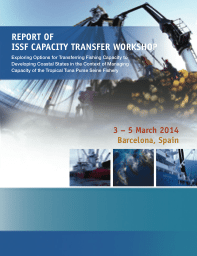Document: ISSF 2014-13: Report of the 2014 ISSF Capacity Transfer Workshop
Exploring Options for Transferring Fishing Capacity to Developing Coastal States in the Context of Managing Capacity of the Tropical Tuna Purse Seine Fishery
3 – 5 March 2014
Barcelona, Spain
Introduction
The Workshop was predicated on two points, the first that growth in tuna fishing capacity must be curtailed and fleet sizes reduced and second that developing coastal States have the right to participate in the fishery.
The 2011 Bellagio Conference on Sustainable Tuna Fisheries recognized that the time is ripe to address overcapacity and the risk of over exploitation; without action the present situation with respect to tuna stocks will steadily deteriorate. The resulting Bellagio Framework for Sustainable Tuna Fisheries highlighted rights-based management as an effective way to address concerns about overcapacity, over exploitation, and conservation, and to create sustainable economic and social benefits, and employment.
Subsequently, the Cordoba Conference on the Allocation of Property Rights in Global Tuna Fisheries concluded that an effective allocation framework is fundamental to the implementation of rights-based management, considering that developing coastal States have a legitimate right to increase their participation in these fisheries. This right comes from the obligations in international instruments to provide assistance to developing coastal States and the right of coastal States to manage and exploit fisheries within their exclusive economic zones and to participate in fisheries on the high seas. Thus, the challenge is to identify mechanisms to facilitate their increased participation, while at the same time curtailing growth in overall fishing capacity.
The objective of this Workshop was to initiate a dialogue on how transfers of capacity, of various forms , to developing coastal States within the context of tropical tuna purse seine fisheries could work in practice. To achieve this objective, the Workshop brought together experts from the fishing industry, coastal State and flag State fishery managers, RFMO Secretariat representatives, policy-makers, academics and other stakeholders to share their views and experiences. The Workshop recognized that there are a wide range of different economic, political and other considerations associated with considering capacity transfer to developing coastal States and that purse seine fishing is only one component of tropical tuna fisheries. Other gear types will eventually have to be considered.
The Workshop, co-chaired by Dr. Robin Allen and Mr. Drew Wright, was conducted in the same format as the workshop that produced the Bellagio Framework. This format allowed the participants to engage in debate and discussion in a collaborative and neutral venue, taking part in their personal capacities. This Workshop built upon the Bellagio and Cordoba Workshops and is envisaged as a stepping stone to other workshops in this series. It provided a basis for productive exchanges that may contribute to related discussions between States, industry and in RFMOs, and help build bridges and understanding.
Downloads: 11177 | 10451276 | Views: 2
